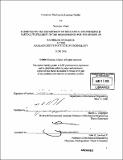Compliant mechanism learning toolkit
Author(s)
Allard, Nicholas (Nicholas A.)
DownloadFull printable version (2.332Mb)
Other Contributors
Massachusetts Institute of Technology. Dept. of Mechanical Engineering.
Advisor
Martin L. Culpepper.
Terms of use
Metadata
Show full item recordAbstract
This thesis concerns a toolkit designed to assist in learning the behavior of complaint mechanisms. In the design of complaint mechanisms, increasingly complicated designs behave in ways that are harder to intuitively predict. This kit would allow for the rapid construction and disassembly of mechanisms with various constraint arrangements without the need to fabricate new models for each arrangement. This project includes the prototype of such a kit that would be manufactured for use in a classroom setting. The kit itself includes plates used to simulate a rigid ground, flexible components that can be mounted at variable angles to flat surfaces, and rigid stages to be connected to ground by the flexible constraint elements. These components are attached to each other using magnets, which allow them to be completely disassembled for rearrangement or storage. The resulting prototype worked roughly according to expectations. Rigid components attached to the kit walls with the flexible elements would translate about 0.3 inches without issue. The dynamic response of these displacements was very visible. (cont.) Rotations of rigid stages, however, moved a few degrees and would not show any pure dynamic response after being released. In terms of viewing degrees of freedom, however, the kit was helpful in the visualization process.
Description
Thesis (S.B.)--Massachusetts Institute of Technology, Dept. of Mechanical Engineering, 2006. Includes bibliographical references (p. 43).
Date issued
2006Department
Massachusetts Institute of Technology. Department of Mechanical EngineeringPublisher
Massachusetts Institute of Technology
Keywords
Mechanical Engineering.